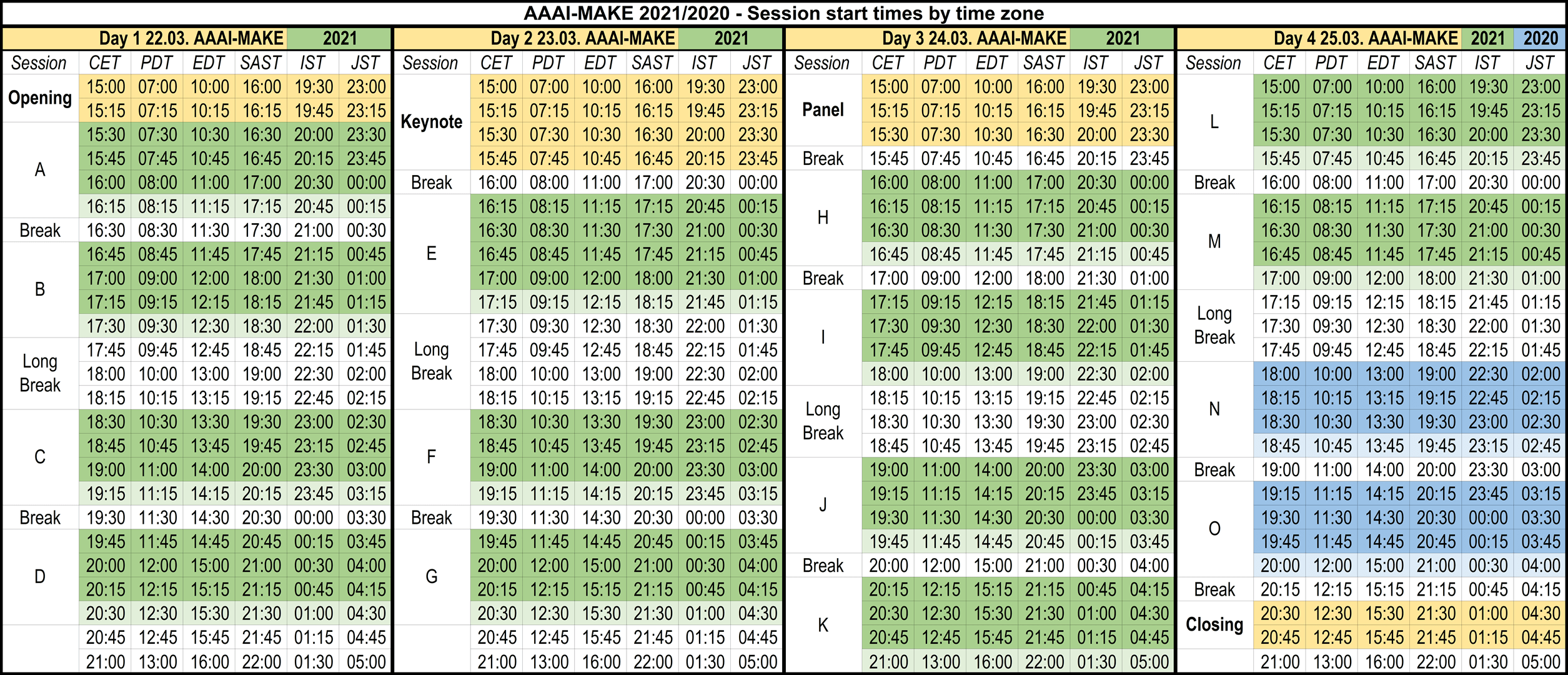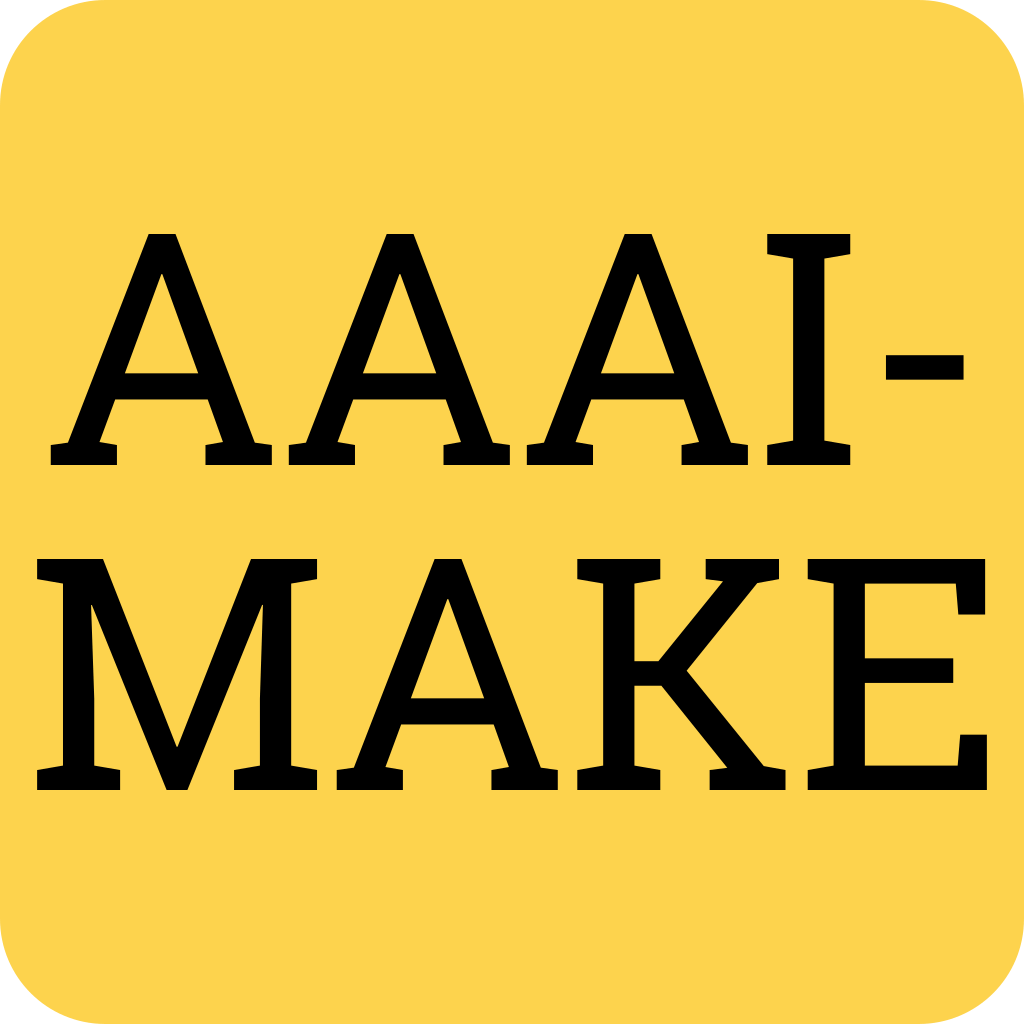Welcome to AAAI-MAKE 2021/2020 – an international and virtual AI symposium. Please note that the 2021 symposium on March 22-25 has been extended by one day to include presentations from the deferred 2020 symposium and to allow attendees from different time zones (UTC -8 to +9) to participate. You will find the program and the respective start times broken down by time zones on this page. This international AI event will occur via the Zoom conference platform and can only be attended after prior registration.
Presentation Format
Symposium contributors will present virtually (see Virtual Conference Participation) their paper in a short 10-minute presentation with slides shown via the shared screen, followed by a 5-minute discussion.
Three to four presentations are grouped into sessions chaired by a member of the organizing committee or invited session chairs.
Start Times by Time Zone

Monday, March 22
Opening
Combining Machine Learning and Knowledge Engineering 📄paper
Andreas Martin and Knut Hinkelmann, FHNW
Session A
Chair: Andreas Martin • 15 minutes per paper
Decision Support combining Machine Learning, Knowledge Representation and Case-Based Reasoning 📄paper
Carlo Mehli, Knut Hinkelmann and Stephan Jüngling
Supporting Case-Based Reasoning with Neural Networks: An Illustration for Case Adaptation 📄paper
David Leake, Xiaomeng Ye and David Crandall
The Significance of Computational Performance for Enterprise AI in Question-Answering 📄paper 📹recoding
Jan Meiswinkel, Patrick Levi and Rainer Hoch
Session B
Chair: Aurona Gerber • 15 minutes per paper
Knowledge Infused Policy Gradients for Adaptive Pandemic Control 📄paper
Kaushik Roy, Qi Zhang, Manas Gaur and Amit Sheth
Evaluation of Machine Learning Algorithms in a Human-Computer Hybrid Record Linkage System 📄paper 📹recoding
Mahin Ramezani, Hye-Chung Kum and Guru Ilangovan
Enhancement of Record Linkage by Using Attributes containing Natural Language Text 📄paper
Philipp Behnen, Felix Kruse and Jorge Marx Gómez
Session C
Chair: Raymond Mooney • 15 minutes per paper
Towards More Robust Fashion Recognition by Combining of Deep-Learning-Based Detection with Semantic Reasoning 📄paper
Achim Reiz, Mohamad Albadawi, Kurt Sandkuhl, Matthias Vahl and Dennis Sidin
Neural-Symbolic Integration for Fairness in AI 📄paper
Benedikt Wagner and Artur D’Avila Garcez
A Neural-Symbolic Approach for User Mental Modeling: A step towards building exchangeable identities 📄paper
Hossein Rahnama, Marjan Alirezaie and Alex Pentland
Session D
Chair: Hans-Friedrich Witschel • 15 minutes per paper
Towards Kinematically Constrained Real Time Human Pose Estimation using Sparse IMUs 📄paper 📹recoding
Deepak Nagaraj, Rhett Dobinson and Dirk Werth
Deep Learning Approaches for Forecasting Strawberry Yields and Prices Using Satellite Images and Station-Based Soil Parameters 📄paper
Mohita Chaudhary, Mohamed Sadok Gastli, Lobna Nassar and Fakhri Karray
Anomaly Detection in Railway Infrastructure 📄paper
David Morandi and Stephan Jüngling
Tuesday, March 23
Keynote
Keynote
Doug Lenat, CEO of Cycorp, Inc. and AAAI Fellow
Session E
Chair: Knut Hinkelmann • 15 minutes per paper
A Recap of Early Work on Theory and Knowledge Refinement 📄paper
Raymond Mooney and Jude Shavlik
Evaluating artificial short message service campaigns through rule based multi-instance multi-label classification 📄paper
Johannes Sahlin, Håkan Sundell, Håkan Alm and Jesper Holgersson
Implications of Combining Domain Knowledge in Explainable Artificial Intelligence 📄paper
Sheikh Rabiul Islam and William Eberle
XAI for Operations in the Process Industry – Applications, Theses, and Research Directions 📄paper
Arzam Kotriwala, Benjamin Kloepper, Marcel Dix, Gayathri Gopalakrishnan, Dawid Ziobro and Andreas Potschka
Session F
Chair: Reinhard Stolle • 15 minutes per paper
Guiding Parameter Estimation of Agent-Based Modeling Through Knowledge-based Function Approximation 📄paper
William Broniec, Sungeun An, Spencer Rugaber and Ashok Goel
Exploring the Hyperparameters of XGBoost Through 3D Visualizations 📄paper
Ole-Edvard Ørebæk and Marius Geitle
Using Camera-Drones and Artificial Intelligence to Automate Warehouse Inventory 📄paper
Rene Kessler, Christian Melching, Ralph Göhrs and Jorge Marx Gómez
Session G
Chair: Knut Hinkelmann • 15 minutes per paper
Batch-like Online Learning for More Robust Hybrid Artificial Intelligence: Deconstruction as a Machine Learning Process 📄paper
Thomas Schmid
Improving machine learning performance using conceptual modeling 📄paper
Arturo Castellanos, Alfred Castillo, Monica Chiarini Tremblay, Roman Lukyanenko, Jeffrey Parsons and Veda C. Storey
Hybrid AI using Graph Neural Networks in Scene Classification 📄paper
Maaike de Boer and Fieke Hillerström
Wednesday, March 24
Panel
Moderation: Knut Hinkelmann
Panel Discussion
Hans-Georg Fill, University of Fribourg, Switzerland.
Aurona Gerber, University of Pretoria, South Africa.
Doug Lenat, CEO of Cycorp, Inc. and AAAI Fellow.
Andreas Martin, FHNW University of Applied Sciences and Arts Northwestern Switzerland.
Reinhard Stolle, Argo AI GmbH, München, Germany.
Frank van Harmelen, VU University, Amsterdam, Netherlands.
Session H
Chair: Hans-Georg Fill • 15 minutes per paper
Fit to Measure: Reasoning about Sizes for Robust Object Recognition 📄paper 📹recoding
Agnese Chiatti, Enrico Motta, Enrico Daga and Gianluca Bardaro
ZERO – Detect objects without training examples, by knowing their parts. 📄paper
Gertjan Burghouts and Fieke Hillerström
Knowledge Engineering with Image Data in Real-World Settings (DEMO) 📄paper 📹recoding
Margaret Warren, David A. Shamma and Pat Hayes
Session I
Chair: Aurona Gerber • 15 minutes per paper
EmEL++ : Embeddings for the EL++ Description Logic 📄paper
Sutapa Mondal, Sumit Bhatia and Raghava Mutharaju
Towards Automatic Ontology Alignment using BERT 📄paper
Sophie Neutel and Maaike de Boer
Ontology-based transfer learning in the airport and warehouse logistics domains 📄paper 📹recoding
Miriam Herold and Mirjam Minor
Session J
Chair: Reinhard Stolle • 15 minutes per paper
Neuro-Symbolic Deductive Reasoning for Cross-Knowledge Graph Entailment 📄paper 📹recoding
Monireh Ebrahimi, Md Kamruzzaman Sarker, Federico Bianchi, Ning Xie, Aaron Eberhart, Derek Doran, Hyeongsik Kim and Pascal Hitzler
Learning profile-based recommendations for medical search auto-complete 📄paper
Guusje Boomgaard, Selene Báez Santamaría, Ilaria Tiddi, Robert-Jan Sips and Zoltán Szlávik
Using a General Prior Knowledge Graph to Improve Data-Driven Causal Network Learning 📄paper
Meghamala Sinha and Stephen Ramsey
Session K
Chair: Pascal Hitzler • 15 minutes per paper
Hybrid Conversational AI for Intelligent Tutoring Systems 📄paper
Charuta Pande, Hans Friedrich Witschel, Andreas Martin and Devid Montecchiari
Semantic Enrichment of Pretrained Embedding Output for Unsupervised IR 📄paper
Edmund Dervakos, Giorgos Filandrianos, Konstantinos Thomas, Alexios Mandalios, Chrysoula Zerva and Giorgos Stamou
Automated Construction of Knowledge-Bases for Safety Critical Applications: Challenges and Opportunities 📄paper
Amit Bhatia and Alessandro Pinto
Thursday, March 25 (extended)
Session L
Chair: Aurona Gerber • 15 minutes per paper
The FATE system: FAir, Transparent and Explainable decision making 📄paper
Joachim de Greeff, Maaike de Boer, Fieke Hillerström, Freek Bomhof, Wiard Jorritsma and Mark Neerincx
SAMS: Human-in-the-loop Approach to Combat the Sharing of Digital Misinformation 📄paper
Shaban Shabani, Zarina Charlesworth, Maria Sokhn and Heiko Schuldt
Team Design Patterns for Moral Decisions in Hybrid Intelligent Systems: A Case Study of Bias Mitigation 📄paper 📹recoding
Jip van Stijn, Mark Neerincx, Annette ten Teije and Steven Vethman
Session M
Chair: Hans-Georg Fill • 15 minutes per paper
“Is depression related to cannabis?”: A Knowledge-Infused model for Entity and Relation Extraction with Limited Supervision 📄paper
Kaushik Roy, Usha Lokala, Vedant Khandelwal and Amit Sheth
Towards unsupervised knowledge extraction 📄paper
Dorothea Tsatsou, Konstantinos Karageorgos, Anastasios Dimou, Javier Carbo, Jose Molina and Petros Daras
Capturing Knowledge of Emerging Entities from Extended Search Snippets 📄paper
Sunday Ngwobia, Saeedeh Shekarpour and Faisal Alshargi
Session N
Chair: Andreas Martin • 15 minutes per paper
Case-Based System of User Interface Reverse Engineering 📄paper
Pavel Myznikov
A Study in Practical Solutions to Sarcasm Detection with Machine Learning and Knowledge Engineering Techniques 📄paper
Chia Zheng Lin, Michal Ptaszynski, Masui Fumito, Gniewosz Leliwa, Michal Wroczynski
Combining Symbolic and Sub-symbolic AI in the Context of Education and Learning 📄paper 📹recoding
Rainer Telesko, Stephan Jüngling, Phillip Gachnang
Session O
Chair: Knut Hinkelmann • 15 minutes per paper
Common-Knowledge Concept Recognition for SEVA 📄paper
Jitin Krishnan, Patrick Coronado, Hemant Purohit, Huzefa Rangwala
Attribution-based Salience Method towards Interpretable Reinforcement Learning 📄paper
Yuyao Wang, Masayoshi Mase, Masashi Egi
Using Pre-trained Transformer Deep Learning Models to Identify Named Entities and Syntactic Relations for Clinical Protocol Analysis 📄paper
Miao Chen, Fang Du, Ganhui Lan, Victor Lobanov
Closing
Concluding AAAI-MAKE
Knut Hinkelmann and Andreas Martin, FHNW
Virtual Conference Participation
All participants will receive credentials for accessing the virtual symposium meeting. This information will be sent to you shortly before the symposium via the email address you used for registration.
The virtual symposium meeting will be hosted on the Zoom conference platform. Please note to have Zoom (at least version 5.0) installed (https://zoom.us/download) in advance of the symposium.
It is appreciated that participants mute their microphones when not speaking but activate their webcam throughout the symposium.
Video Recording and Release
During the AAAI-MAKE meeting, it is intended to record selected presentations and make them available online later. The recording will be configured so that only the active speaker’s video with the shared screen will be recorded exclusively.
If presenters wish a recording of their presentation, the AAAI photograph release form must be filled out, signed and uploaded, before the symposium.
Registration*
Accepted authors, invited speakers, symposium participants, and other invited attendees must register to participate at the virtual symposia. Please register via the online registration form (https://aaaiconf.cventevents.com/sss21).
* The Association for the Advancement of Artificial Intelligence (AAAI) is responsible for the overall organization of all the Spring Symposium Series. For any inquiries related to registration please contact the AAAI at sss21@aaai.org or consult the AAAI’s website (https://aaai.org/Symposia/Spring/sss21.php).
